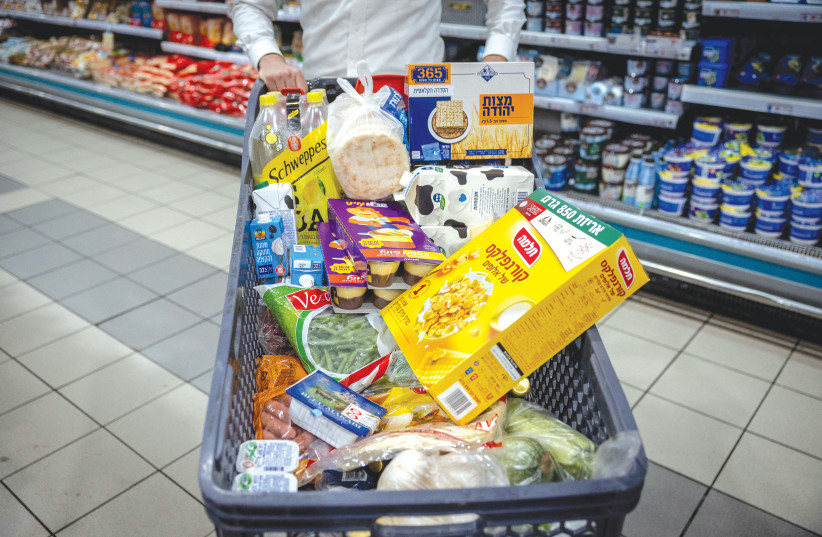In the face of mounting economic challenges and soaring living costs, a significant portion of the population is grappling with the prospect of cutting back on holiday expenses.
A recent study conducted by the International Fellowship of Christians and Jews (IFCJ) has shed light on the financial hardships experienced by many, revealing that 43% of the Jewish public in Israel anticipates reducing their spending on groceries for holiday dinners, while 30% believe they will require assistance to complete their holiday shopping.
These findings come against a backdrop of widespread price increases across all aspects of daily life, prompting the International Fellowship of Christians and Jews to initiate a critical aid operation for the Tishrei holidays. Currently, around a quarter of a million elderly individuals, families, and welfare children are receiving food and clothing aid grants from the IFCJ, with a total value exceeding NIS 30 million.
Hindered quality of life
Of the 1,104 surveyed citizens aged 18 and above, 47% admitted to avoiding electricity usage due to financial constraints, with 17% frequently refraining from electrical appliance use. Additionally, 40% reported a declining standard of living, especially among low-income individuals (51%) and the 35-54 age group (48%).
The study highlighted the extent to which people have had to cut back on expenses, as 61% have cut back on various expenses, particularly for basic food costs. This marks a 10% increase since 2021. Entertainment (48%) and clothing (42%) saw the most significant reductions, followed by transportation (25%), electricity (18%), medicines (9%), and water (8%). These cutbacks were most common in the 35-54 age group (72%) but also affected other demographics.

Regarding elderly loneliness, 34% currently feel lonely, a decrease from the peak of the pandemic in 2021 (41%). Yet, 26% still experience solitude at home for three to seven days a week, only a slight improvement from 2021 (30%).
High (cost) holy days
Concerning the Tishrei holidays, 43% of the Jewish public plans to spend less on groceries due to financial constraints, with the most significant reductions anticipated among low-income earners (56%). Furthermore, 30% expect to need assistance for holiday shopping, reflecting a substantial increase from 2021 (22%). Most will turn to relatives, especially those with low incomes (51%).
These statistics highlight the growing extent of poverty and social inequality in Israel, with nearly one in five families residing below the poverty line. The rising prices, particularly in recent months, have placed tremendous strain on the country’s vulnerable populations. Food insecurity, in particular, is a pressing issue, as spending on food is often the first expense reduced when individuals and families face financial difficulties. The inability to access basic food products becomes especially distressing during the festive season.
The IFCJ steps in
To address this urgent situation, the IFCJ has allocated approximately NIS 30m. for food and clothing assistance, benefiting not only the elderly but also families, lone soldiers, boarding school children, new immigrants, and others in need. Additionally, an extra budget of around NIS 4.5m. has been set aside to aid approximately 50,000 men and women in Jewish communities in the former Soviet Union, providing food packages and assistance to the elderly, among other support measures.
The aid operation includes the distribution of various assistance cards, with different denominations, to help struggling individuals and families purchase essential items. These cards will be provided to a wide range of beneficiaries, including single families in public housing, associations, organizations, Holocaust survivors, and children in need.
“The increase in prices in all areas of life and the increased cost of living as a result create harm to all strata of the population in Israel. The harm ultimately affects especially the weaker sections, who are always the first to be affected.”
Yael Eckstein
“The increase in prices in all areas of life and the increased cost of living as a result create harm to all strata of the population in Israel. The harm ultimately affects especially the weaker sections, who are always the first to be affected,” said Yael Eckstein, president of the IFCJ.
“As part of the IFCJ’s aid operation for the holidays, we wish to help as many families and elderly people as possible to celebrate in a happy and respectful way,” she added. “We are grateful to over 600,000 donors who love Israel, who, despite the global crisis, are mobilizing now more than ever to help the citizens of Israel and our sisters and brothers in the Diaspora.”
